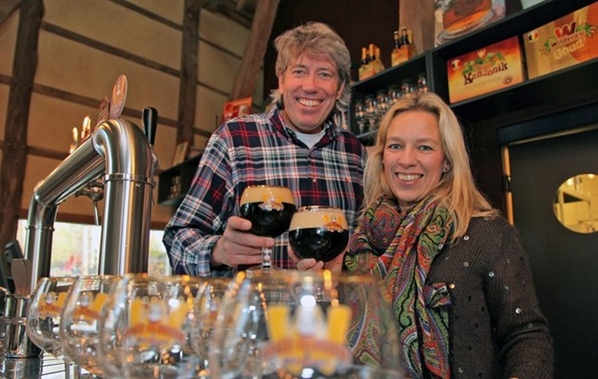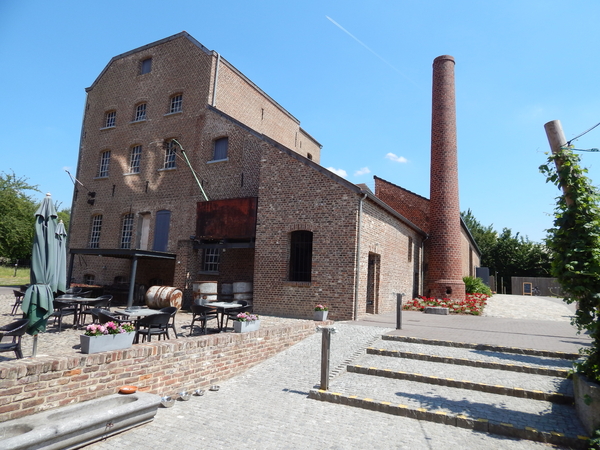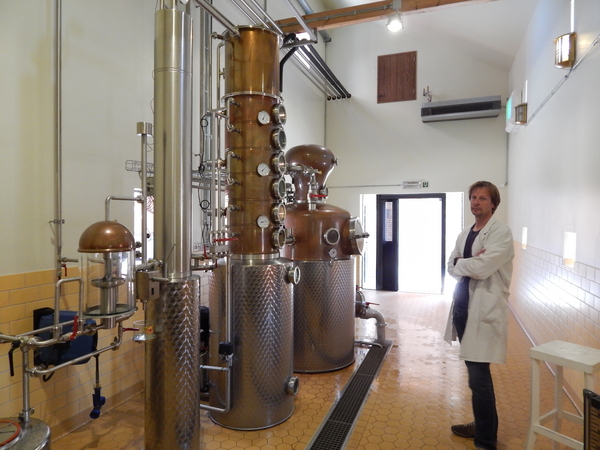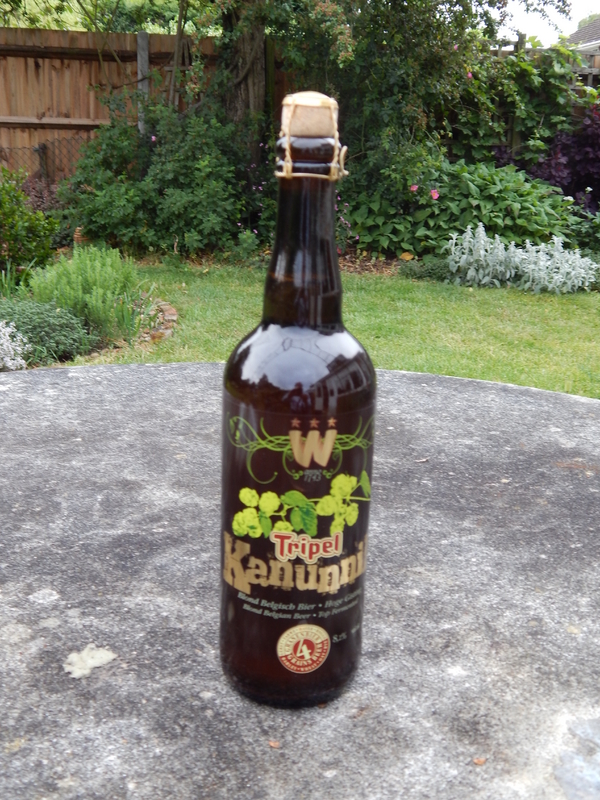Wilderen is wild with beer, whisky & gin
Added: Thursday, June 25th 2015

If you’re quietly enjoying a beer in the café at Wilderen and you hear the strains of Ravel’s Bolero you’ll know it’s midnight and drinking will stop in an hour’s time. The spacious and raftered building has been lovingly crafted from an 18th century farmhouse in a village on the outskirts of Sint-Truiden in Belgian Limburg. Every weekend large crowds descend to enjoy the beer, visit the brewery next door and eat good meals that include hop cheese made especially for Wilderen.
Your last drink before the doors close may not be one of the brewery’s beers. For the site also includes a distillery that produces single malt and blended whiskies, gin and Eau de Bière that’s distillation of Kanunnik Tripel, Wilderen’s 8.2% strong ale.
Brewery, distillery and farm shop-cum-café attract more than 100,000 visitors a year. It’s a remarkable success story for a small business that opened only in July 2011. But the driving force behind the enterprise, Mike Janssens, is vastly experienced in the Belgian brewing industry. He helped found Ter Dolen and also worked for Dentergems when it was part of the Riva group.
When he bought the former farm and distillery in 2007, it was derelict. With his wife Roniek Van Bree (both pictured above), he saw the potential of the site but first had to clear out rats, bats and mice and centuries of accumulated detritus from farm buildings dating from 1642.
“The barns had collapsed and had to be completely renovated,” Mike says.
In 1743 the farmer added a small brewery and in 1890 the family expanded the brewery and added a gin distillery. As the clamour for gin or geneva in the Low Countries grew, distilled spirit soon accounted for 95% of production. But in 1939 brewing and distilling ceased. The owners of Wilderen had no doubt that if the Germans invaded Belgium they would ransack breweries – as they had in World War One -- to take copper vessels back to the Fatherland for weapons production.

Most people would have been daunted by the task of renovating the farm. But Mike Janssen has a passion for beer and a restless desire to run successful companies, while Roniek, with a Masters in Figurative Art, added her skills to fashion attractive new buildings out of the rubble. Her talents have extended to the design of the shop and café, the outside terraces and the bottles and glasses used for beer, whisky and gin.
A new brewery was built in the former stables used to house oxen. The smart Italian-built kit can produce 7,000 hectolitres a year and Mike plans to grow that figure to 20,000 hectos. There are three conical fermenters outside the brewhouse, with space for three more and Mike is negotiating to buy an empty church over the road to give his enterprise greater space – if successful, it will be a fascinating example of uniting God and Mammon in the interests of good beer.
Within just a few years of opening the brewery, Mike is exporting to France, the Netherlands, Sweden, the U.S., Germany, and as far as Australia.
Roland Vanderlinden (below) has the enviable job of being both brewmaster and distiller. In a building a few yards from the brewhouse, he makes gin and whisky on German-built equipment based around an 11-metre central distillation column. The liquids that emerge are Double You Gin and two whiskies, Wild Weasel Single Malt and Wild Weasel Blended Whisky. The whiskies are stored and aged in oak casks for a minimum of three years in the prescribed manner.
The gin is made with blend of no fewer than 21 botanicals and spices, including juniper berries, hops, rose blossom and coriander. Each bottle of gin comes with a packet of liquorice sticks attached for stirring the liquid in the glass.
The gin has won three gold stars in an international competition while Mike and Roland plan to produce a small amount of the single malt whisky in cask strength and one batch will be aged for 10 years. All the products – beer, gin and whisky – are made with water from a well on the site. The water is very hard, Mike Janssens says, and nothing is added to it or taken away.

Visitors are able to tour buildings that house the original distillery. Gin was made on a large scale and all the old vessels and impressive steam engines are on display. Mike led me along a walkway to show me a small entrance behind a metal gate. Steps lead down to a secret cellar where it seems the farmer and distiller in the 19th century stored a substantial proportion of his gin production away from the prying eyes of the excise officers. It meant that a lot of cheap gin was quietly sold in Wilderen and the Sint-Truiden area.
These buildings also house the oak casks where the Wild Weasel whiskies are stored – in full view of the excise officers.
Back in the spacious café and with some hop cheese as an aid, I tasted the Wilderen beers. Goud (6.2%) is brewed with pale malt only and is hopped with Challenger. It’s a blond beer with a good peppery hop aroma, biscuit malt and tart fruit on the palate, and a dry and lingering finish with a good balance of malt and hops.
Kanunnik Tripel (8.2%) is the brewery’s pride and joy. The name means canon, in honour of the rank of local priest and it pays homage not only to the church over the road but also the abbey of Sint-Truiden. The beer is spiced and is brewed with four grains – barley malt, wheat, oats and rye. The hops are American Cascade and Styrian Goldings. The russet beer has a big spicy aroma that comes from both malts and hops with a pronounced ‘bready’ note from the rye. Raisin and sultana fruit build in the mouth, with a fine balance of spicy hops and rich malt. The finish is long and complex, with vinous fruit, juicy malt and bitter hops.
Cuvée Clarisse (9.2%) is made with roasted grain alongside pale malt, dark candy sugar and Bramling Cross hops. The attractive corked bottle and glass both carry an image of a nun and the beer commemorates a former beguinage or nunnery attached to the abbey of Sint-Truiden. It’s a luscious, sipping beer with massive vinous fruit on aroma and palate, strong hints of roasted grain, liquorice, caramel and earthy hop bitterness. The finish lingers, with ripe fruit, bitter hops and continuing notes of caramel and liquorice.
A few glasses of Clarisse at midnight in the café at Wilderen could inspire you to rise to the occasion and dance to Ravel’s Bolero.
*Wilderen brewery and distillery, 8 Wilderenlaan, 3803 Wilderen (Sint-Truiden). Tel +32 11 58 06 80. For information about opening times and tours visit the website www.brouwerijwilderen.be






